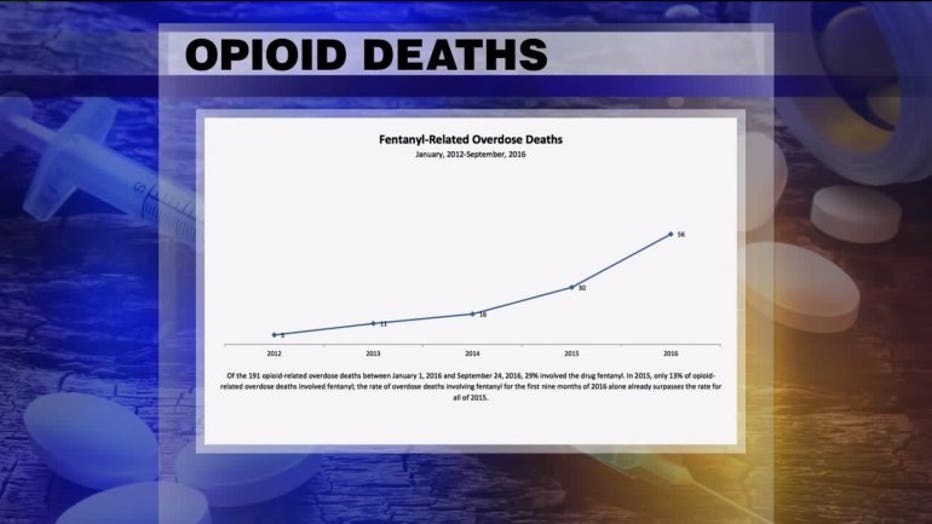“It’s alarming:" Data shows Milwaukee County on pace for record number of opioid overdose deaths
MILWAUKEE -- Milwaukee County is on pace to "significantly eclipse" the 231 heroin and opiate overdose deaths in the county in 2015. This, according to a statement from Alderman Michael Murphy and a study conducted by the Medical College of Wisconsin.
"https://twitter.com/mkemedexamine/status/804165995422171136
A report from the Milwaukee County Medical Examiner's Office shows through September 24th, 2016 -- 191 people had fallen victim to opioid overdoses -- compared to 176 by September 24th, 2015.
According to the statement from Alderman Murphy, if overdose deaths continue at this rate in Milwaukee County, the total figure for the year 2016 could exceed 250 (vs. 231 in 2015).
“It’s alarming because the issue is getting more attention than ever before, and yet still the rate of overdoses is climbing. What’s more, the breakdown of data by race, by age and by geographic location shows the problem is as ubiquitous as ever. Absolutely anyone in any part of the county can fall victim," Alderman Murphy said in the statement.

The report notes that through September 24th, 2016, the drug fentanyl was identified as a contributing factor in 56 overdose deaths—compared to 30 deaths in all of 2015, 16 in 2014, 11 in 2013 and five in 2012.
"If you've seen the trend over the last few years, whatever we are doing is not working. You would think with all of the attention that the media has spent on it, a lot neighborhood meetings, public meetings, you would think those numbers would start going the other way, but they haven't," Murphy said.

Alderman Michael Murphy
According to the statement from Alderman Murphy, if these deaths continue at the current rate, the number of fentanyl overdose victims in 2016 will eclipse those in the last four years combined.
“Fentanyl is a powerful and dangerous drug that we see more and more frequently in overdose cases. In some cases, users may know that fentanyl is present, but in many cases it may be mixed into their drugs without their knowledge. Fentanyl is always dangerous when used without medical supervision," Dr. Brooke Lerner, who is leading the Medical College of Wisconsin’s analysis of data from the Milwaukee County Medical Examiner’s Office said in the statement.

The analysis of data from the medical examiner is taking place as part of a two-year community-based, data-driven partnership between the City of Milwaukee, the Zilber Family Foundation and the MCW’s Department of Emergency Medicine to examine key metrics of the heroin and opiate abuse epidemic, Murphy said.
The Milwaukee COPE (Community Opioid Prevention Effort) got underway earlier this year under legislation sponsored by Alderman Murphy, and regular updates are expected as the initiative proceeds, Alderman Murphy's statement said.
To best utilize the data, Alderman Murphy will introduce Common Council legislation creating a City-County Heroin and Opioid Task Force charged with studying the problem further and presenting policy recommendations to address the issue.
The task force would be composed of representatives from the Common Council, Milwaukee Health Department, Police Department, Fire Department, Milwaukee County Circuit Court, Intergovernmental Relations, County Executive’s office, the community and the medical profession.

"The task force is going to bring together law enforcement, medical professionals, treatment providers and addicts themselves to give us a better perspective about how we can change this course," Murphy said.
This legislation will be taken up by the Milwaukee Common Council's Public Safety Committee Thursday, December 1st.
“As we continue to better understand the breadth of the heroin and opiate abuse epidemic, the next step is to translate facts into action. By bringing together experts from both the public and private sectors and multiple government jurisdictions, I hope to be able to craft an effective set of policy recommendations that can help reverse this startling, deadly trend," Alderman Murphy said in the statement.

Heroin
Alderman Murphy said this community effort is augmented by Thursday's launch of the Drug Mail Back Program championed by Alderman Jim Bohl.
The program creates a safe, convenient method to dispose of unused or unwanted medication, reducing the opportunities for surplus medication to contribute to addiction issues.


